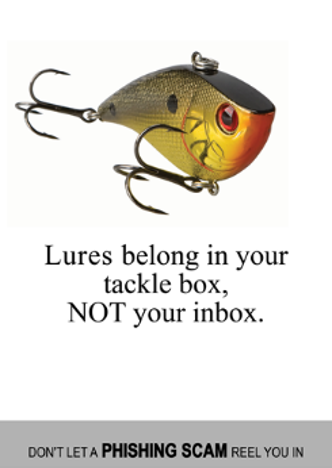Phishing attacks pose a major risk to any organization and continue to target people at WCU. Since these threats won’t go away any time soon, it is important to provide education about the warning signs of phishing, the potential risks of falling prey to an attack, and how we can protect ourselves from getting hooked.

You may not realize it, but you are a phishing target at school, at work, and at home.
- What do they want? They want to lure you into exposing sensitive information like your username and password, bank account or credit card numbers, birthdate and phone numbers.
- Know the signs. Does the e-mail contain a vague salutation, spelling or grammatical errors, an urgent request, and/or an offer that seems impossibly good? Click that delete button.
- Verify the sender. Check the sender’s e-mail address to make sure it’s legitimate.
- Don’t be duped by aesthetics like logos or links to real websites.
- Never, ever share your password. Did we say never? Yup, we mean never.
- Avoid opening links and attachments from unknown senders.
- Don’t open any attachments unless you’re expecting a file from someone. Give them a call if you’re suspicious.
- When you’re not sure, call to verify. If the message is urging you to take action —exercise caution. Don’t hesitate to contact the company or sender directly to verify.
- Don’t talk to strangers! Phishing also happens via phone and text messaging.
- Don’t be tempted by abandoned flash drives. Be wary — it could be a trap to infect your computer with malware.
- What to do if you get phished through your WCU Email account:
- If you still have the email in your Inbox, Right-click on it, then select Junk, Block Sender. This will help prevent these emails from coming to your Inbox in the future.
- Forward the email to ithelp@wcu.edu for any further action needed for the campus community.
Watch the Video: Stay Safe from Phishing and Scams
